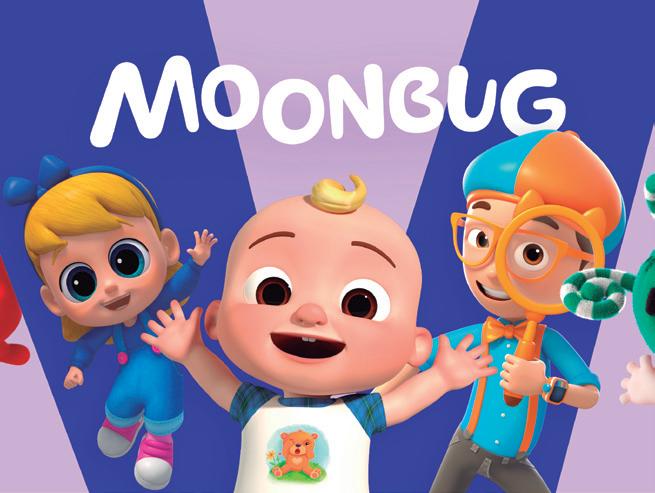
2 minute read
DISTRIBUTION THE SUCCESSFUL PATH OF BUILDING BRANDS
"COCOMELON,"
AND
ARE SOME OF THE MOST POPULAR IPS OF MOONBUG ENTERTAINMENT. NICOLAS EGLAU, MANAGING DIRECTOR FOR EMEA AND APAC, AND DILEK DOYRAN, HEAD OF CHANNEL PARTNERSHIPS FOR EMEA, DESCRIBE THE EVOLUTION OF THE COMPANY'S BUSINESS STRATEGY.
Moonbug Entertainment was launched in 2018 by René Rechtman and John Robson, who had the idea to acquire creator-led IP that had already generated a fan base, which meant they weren't building an audience from scratch. Five years later, the media company has a robust catalog with strong IPs for kids and families. Today, hit series such as "Little Baby Bum," "CoComelon," and "Blippi" resonate worldwide. "We started distributing the series on premium SVOD and AVOD platforms and linear broadcasters like RTL in Luxembourg, Clan in Spain, and Cartoonito in Italy. We believe every family should be able to access our entertaining and enriching content in whichever way they are used to consuming content," mentioned Nicolas Eglau, Managing Director of EMEA and APAC at Moonbug.

Over the last few years, the company has experienced significant growth in the EMEA region. In 2021, Moonbug partnered with OSN to launch the Moonbug branded 24/7 linear preschool kids' channel in the Middle East and North Africa, reaching 28 countries. Later, in September 2022, Moonbug announced an agreement with MultiChoice for MoonbugChannel on the African pay TV service DStv, reaching 45 countries. "We started with the most challenging multi-territory part of EMEA," commented Dilek Doyran, Head of Channel Partnerships. "Turkey is also an interesting market for Moonbug because it is where we are most successful regarding YouTube views, right after the UK. We have launched the Moonbug Channel with TV+, Tivibu, and Kablo in Turkey over the past year," Doyran said. She added that Moonbug also focuses on Western territories and mentioned agreements with O2 in the Czech Republic and Slovakia. "Our ambition is to expand the reach of Moonbug Channel because the linear consumption is still a popular ecosystem for parents with preschool children across EMEA and APAC," she said.

Moonbug's executives attributed the company's success to their insights and knowledge about kids' and parents' needs and the creativity of its studios' team. "Moonbug has a strong reputation for co-viewed preschool content. In addition, the young audience is very loyal, illustrating a 'super-fan' engagement across brands with a high repetition rate," described Eglau. Moreover, the company is very selective in its new projects. "We spend much time reviewing our own shows, being very critical about all our content, and constantly improving and thinking about how we can develop a brand. It's all about franchise building," he said.
360 Strategy
At Moonbug, one relevant criteria when identifying great content is ensuring that a show promotes empathy, compassion, and resilience. These universal values resonate across all Moonbug projects, which aim to inspire and engage children with fun and responsible storytelling. By leveraging Moonbug's creative and production expertise, the company grows these properties from much-loved YouTube shows into global entertainment franchises.
Music is integral to the Moonbug shows, so the company has a dedicated music business. "We are also trading premium originals, which is another product with partners, whether global partners like Netflix or Amazon, or local partners like Sky or Viaplay in the Nordics," said Eglau.
Additionally, Moonbug Entertainment boasts a robust consumer product and live entertainment business. "That strategy makes sense because kids love 'CoComelon,' and want to extend their storytelling into their playrooms. That is another way for us to expand our brand beyond the screen," Doyran stated. "We also want to bring our characters on stage so our fans can see them and interact with the brand in a shared environment. It is definitely a 360 approach, but it always starts with good content," Eglau remarked.
By Romina Rodríguez and Karla Flores










